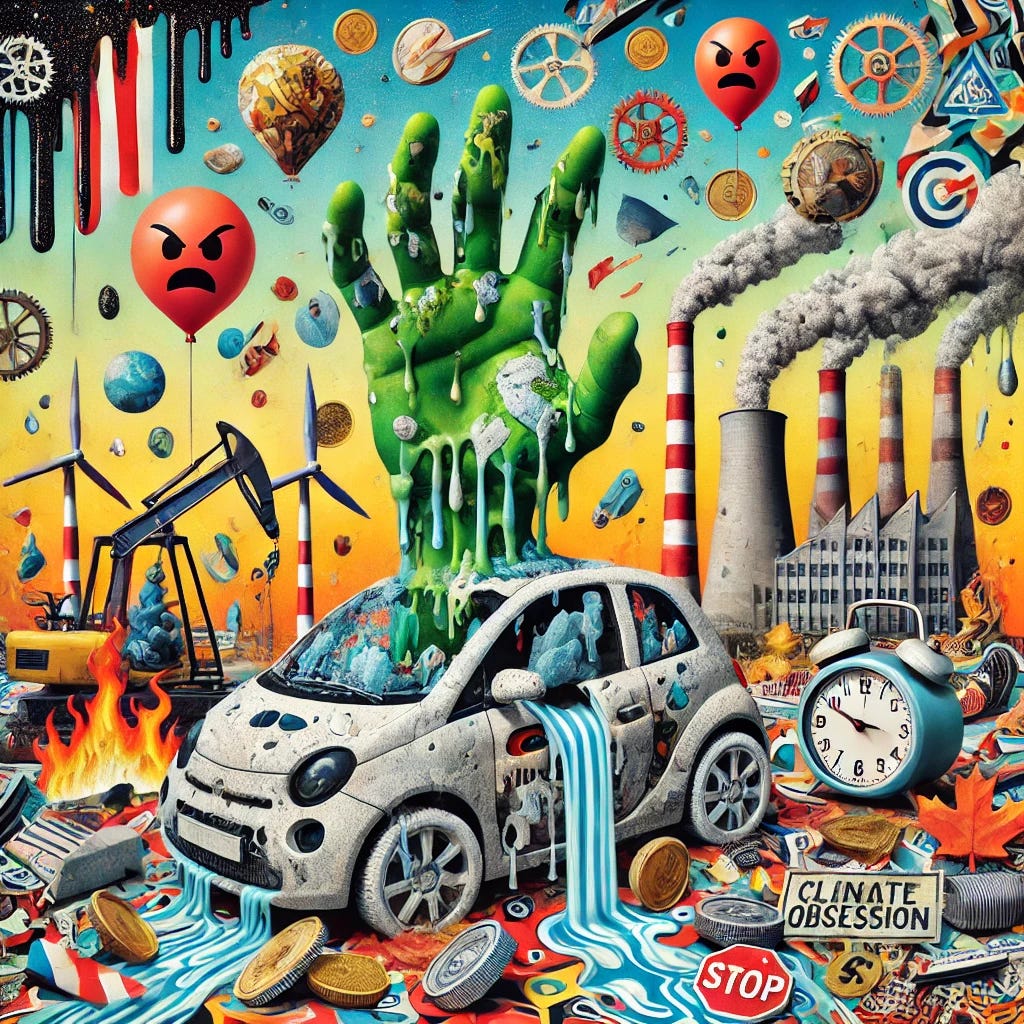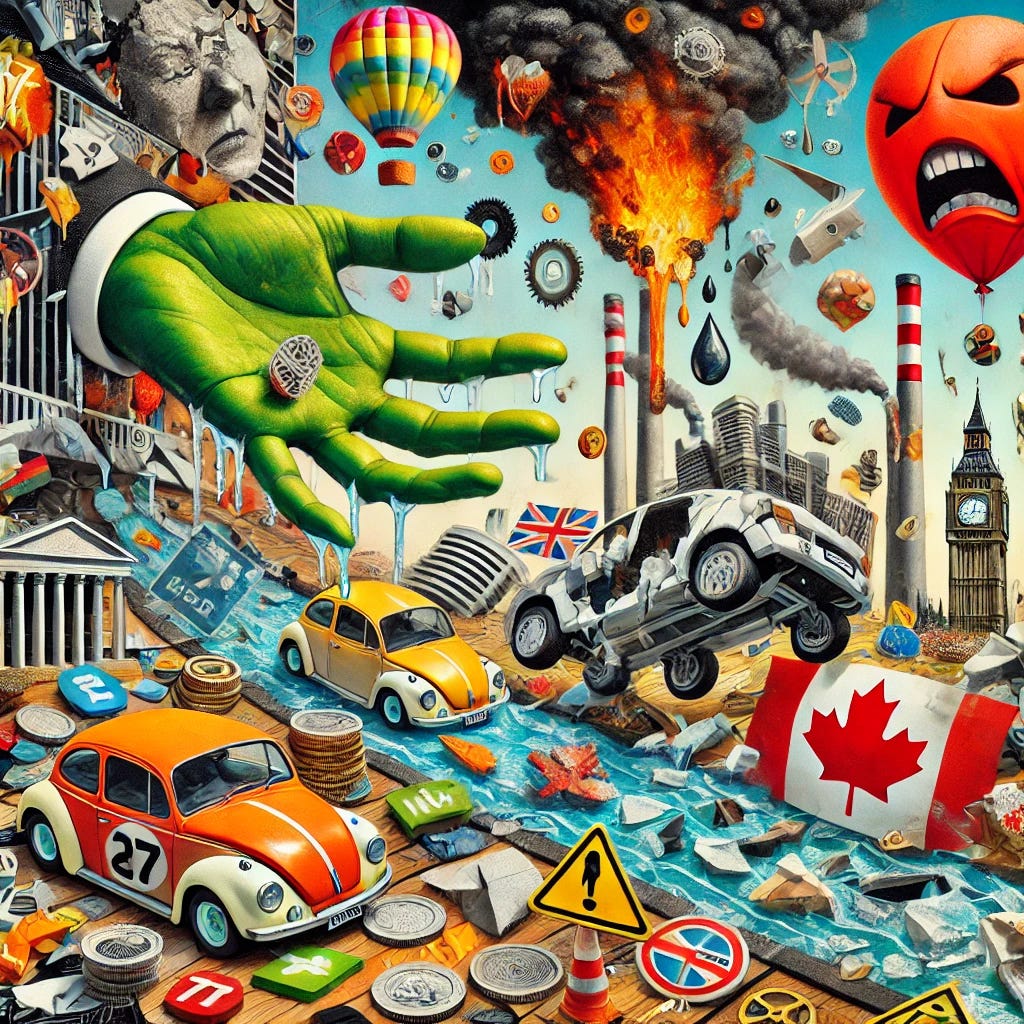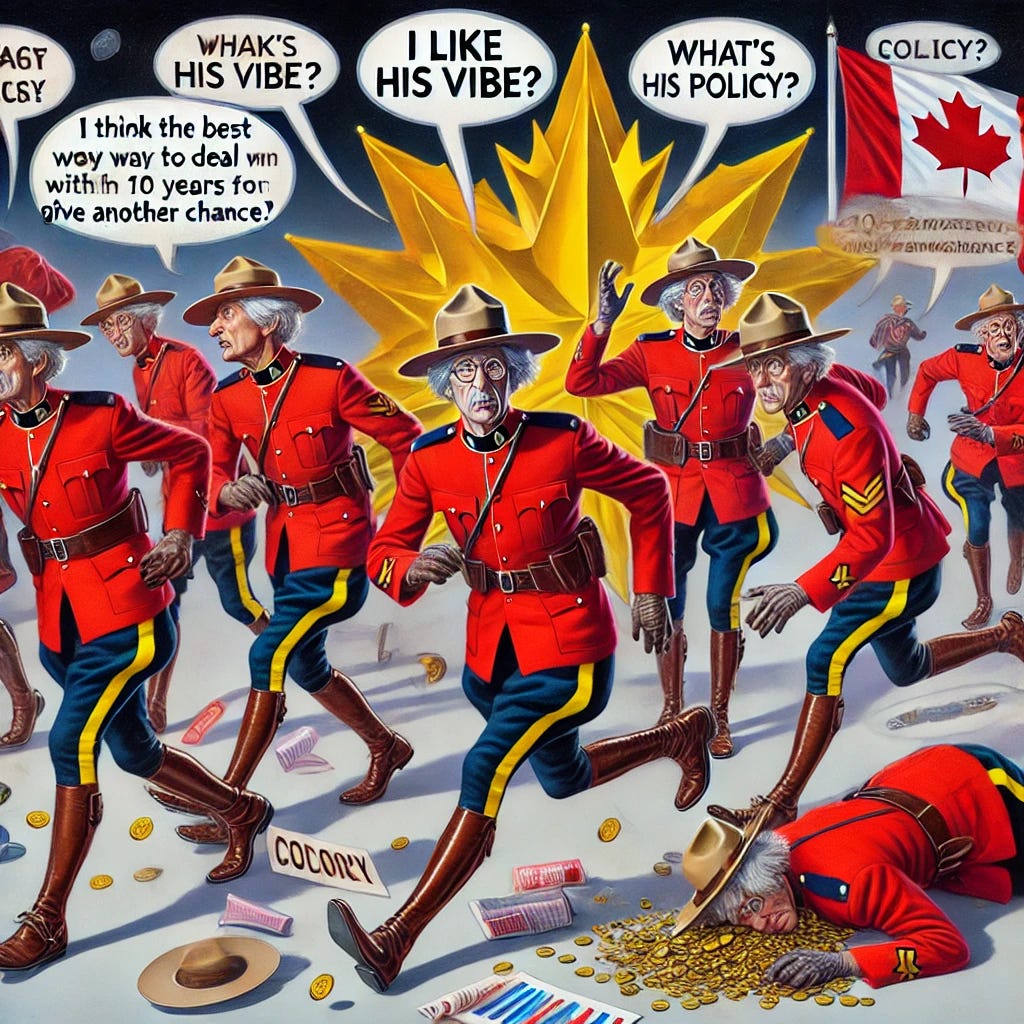The Eternal Stupidity of the Canadian Boomer Voter
Please look at facts, for God's sake, you aren't electing a drinking buddy. And Carney is actually a complete ass, known for his volcanic temper and his general contempt for inferiors (all of us)
This could end up being the biggest mistake in Canadian political history.
If you believe in the importance of free speech, subscribe to support uncensored, fearless writing—the more people who pay, the more time I can devote to this. Free speech matters. I am a university professor suspended because of a free speech issue, so I am not speaking from the bleachers. The button below takes you to that story.
Please subscribe to receive at least three pieces /essays per week with open comments. It’s $6 per month, less than USD 4. Everyone says, "Hey, it’s just a cup of coffee," but please choose my coffee when you come to the Substack counter. Cheers.
Analysis of the Top Five Stupidities of Carney’s "All-in-Canada" Car Idea
Ignoring Global Supply Chains
Carney’s vision of a fully Canadian-made car overlooks the reality of modern manufacturing. The auto industry relies on intricate, cost-efficient global supply chains—think semiconductors from Asia, steel from the U.S., or batteries from China.
Forcing every component to be made in Canada would skyrocket costs, making these cars uncompetitive against foreign brands. It’s a fantasy of autarky in a world that thrives on interdependence.
Underestimating Resource Dependency
Canada’s economy leans heavily on its resource sector—about 25% of GDP comes from oil, gas, mining, and forestry. Carney’s push for a green-focused auto industry dismisses this strength, betting instead on unproven "green jobs" in a sector lacking scale. It’s like trading a reliable workhorse for a shiny, untested pony.
Overlooking Market Demand
Canadians buy cars based on price, quality, and brand, not national pride. A "Made in Canada" car risks being a niche product nobody wants, especially if it’s pricier due to domestic-only production. Carney thinks patriotism will override wallets, a pipe dream in a free market.
Costly Climate Obsession
Carney’s a banker, not a politician or industrialist. He’s never run a government or built a factory. Proposing a radical overhaul of an industry he doesn’t fully grasp shows a disconnect from the gritty realities of manufacturing and policy-making.
It’s a rookie mistake dressed up as a bold vision.
Five Better Ideas
Leverage Existing Strengths
Focus on enhancing Canada’s auto parts sector—already a $20 billion industry—by specialising in high-demand components like batteries or electric drivetrains, integrating with North American supply chains rather than reinventing the wheel.Boost Resource-Based Manufacturing
Use Canada’s abundant metals (lithium, nickel, cobalt) to become a leader in battery production for global automakers. This keeps our resource economy humming while tapping into the EV boom without forcing a full car build.Trade Diversification with Realism
Instead of poking Trump in the eye with tariffs, negotiate smarter trade deals with the U.S. and expand markets in Asia and Europe for Canadian goods, balancing resource exports with manufactured products.Affordable Housing Over Green Fantasies
Redirect investment from speculative green projects to housing construction. Solving the housing crisis would boost youth employment, stabilise the economy, and address a real voter priority, unlike a vanity car project.Pragmatic Energy Transition
Support a gradual shift to cleaner energy by incentivising hybrid vehicles and natural gas infrastructure (abundant in Canada), maintaining economic stability while cutting emissions more effectively than Trudeau’s faltering plans.
The Liberal Party Connection and Broader Critique
By the way, let’s be clear: the Liberal Party is the same gang—Carney’s been advising Trudeau for over a year, shaping this economic mess.
Canada must have the stupidest voters in the world.
Our country’s a disaster: the only G7 nation getting poorer, with per capita GDP declining.
Our immigration system’s a shambles—officials admit they "forgot to cap international students." Oops. Our international reputation is trashed, and our youth face sky-high unemployment and a housing crisis that makes homeownership a distant dream.
And yet, we’re poised to elect a World Economic Forum climate hysteric who thinks climate change is all that matters (again, read Values). Carney wants to strangle our banks to kill the golden goose—our 25% resource-based economy—replacing it with a fantasy of green jobs that don’t exist. How stupid is this?
Here’s a kicker: Trump lowered U.S. per capita CO2 emissions more than Trudeau—by about 15% from 2017 to 2020, versus Canada’s 8% drop over a similar stretch.
More extreme than Environment Minister Guilbeault’s, Carney's radical plans promise a laughable 0.01°C temperature drop. He’s a political novice, yet we’re ready to hand him the keys because we like his vibe. We do realise electing the hapless incompetents who tanked our economy, where Alberta’s wealth now lags behind Alabama’s, is a bad idea, right?
These aren’t competent doppelgangers; it’s the same crew. Carney owns this disaster as much as Trudeau.
Are we so foolish that we’ll elect a radical rookie because he’s got an angry, confrontational vibe against Trump? Trudeau tried that finger-poking strategy, and it’s why we’re in this hole. Are we willing to kill our economy just for the joy of sticking it to Trump?
Five Stupidest Trudeau/Carney Ideas
Carbon Tax Fiasco
Trudeau’s signature policy, backed by Carney, jacked up living costs with little environmental gain—emissions barely budged, rebates don’t offset the pain—a masterclass in punishing Canadians for optics.Immigration Chaos
Their open-door policy flooded the country with international students and workers, ignored housing and healthcare capacity, and then they shrugged, "Oops, forgot the cap." Genius.Banking Climate Overreach
Carney’s push (and Trudeau’s nod) to regulate banks into choking fossil fuel funding threatens a quarter of our economy for a negligible climate impact. It’s economic suicide dressed as virtue.Trade War with Trump
Trudeau’s tit-for-tat tariffs, egged on by Carney’s rhetoric, alienated our biggest trading partner, risking recession over pride. Trump’s not blinking, but we’re hurting.Green Jobs Mirage
Both peddled a vision of magical green jobs replacing resource wealth, yet years later. There’s no evidence these jobs exist at scale. It’s a fairy tale that’s left us poorer.In short, Canada is flirting with disaster if we double down on this crew. Electing Carney isn’t a fresh start—it’s the same Liberal incompetence with a new face, chasing vibes over substance. Are we that stupid?
Time will tell.









I fear that Canadians are THAT stupid!
Our freshly minted PM may have committed the cardinal sin in academia that has taken down many careers. The National Post today describes their investigation and findings.
Will this lead to our PMs' walk of shame?
CARNEY FACES PLAGIARISM ACCUSATIONSCatherine Lévesque calevesque@postmedia.com
National Post
Mar 29, 2025
INTERNALLY, IN UBC, WE WOULD CONSIDER IT PATCHWORKING IF IT DID NOT HAVE THE DIRECT CITATION NEXT TO IT, AND IT DOESN’T. EVEN WHEN YOU’RE REWORDING, YOU NEED TO CITE. — GEOFFREY SIGALET, UNIVERSITY OF BRITISH COLUMBIA
OTTAWA • Liberal Leader Mark Carney’s has been accused of taking other people’s ideas as his own in the federal election campaign.
It isn’t new.
The National Post obtained a copy of Carney’s 1995 thesis for his doctorate in economics from Oxford University titled “The Dynamic Advantage of Competition.” It shows 10 instances of apparent plagiarism, according to the judgment of three university academics who reviewed the material for the Post.
In several sections, Carney used full quotes, paraphrases, or slightly modified quotes from four previous works without proper acknowledgement or attribution.
“He’s just directly repeating without quotations. That’s what we call plagiarism,” said Geoffrey Sigalet, an assistant professor and member of UBC president’s advisory committee on student discipline, which handles plagiarism cases for the university.
The National Post provided the 10 examples to Carney’s campaign team. He was sworn in as prime minister on March 14, and is running in an election that will be held April 28.
Rather than a response from Carney, his campaign provided an attestation from his doctoral supervisor at Oxford University.
“I believe you are mischaracterizing this work. As an academic of nearly 40 years, I see no evidence of plagiarism in the thesis you cited nor any unusual academic practices,” said Margaret Meyer, Official Fellow of Economics at Nuffield College, in the provided statement.
“Mark’s thesis was evaluated and approved by a faculty committee that saw his work for what it is: an impressive and thoroughly researched analysis that set him apart from his peers,” added Meyer.
Oxford University defines plagiarism as “(p)resenting work or ideas from another source as your own ... by incorporating it into your work without full acknowledgement.”
A professor who is also a graduate from Oxford, speaking on background out of fear of being sued by Carney, agreed that the problematic passages in the Liberal leader’s thesis would fall within the plagiarism definition.
“Oxford’s guidelines are not atypical from other universities,” he said.
“When you have something lifted verbatim from a source, in there without quotation marks or citation ... that constitutes plagiarism,” added the professor.
Oxford University administrators were also provided the 10 examples but did not respond to a request for comment by deadline.
While Carney refers extensively in his thesis to Michael E. Porter’s 1990 book The Competitive Advantage of Nations, he duplicates parts of Porter’s work and presents several sentences — sometimes with minor tweaks to the wording — as his own.
In one paragraph on page 206 of Carney’s thesis, the similarities are especially stark.
Carney wrote: “First, government intervention can impede international competition and artificially support domestic profits.”
Later, he adds: “Second, in an industry or an economy where many firms are following harvesting strategies, firms may maintain profitability even though they are losing competitiveness.”
Those are virtually the exact sentences that can be found in Porter’s book on page 797 — except Carney added the extra article “an” and the adverb “even.” He did not use quotation marks or add a footnote to reference Porter’s work anywhere in the paragraph.
Meyer, his doctoral supervisor at Oxford, said “it is typical that overlapping language appears” when sources are “frequently referenced in an academic text.”
“For example, over the course of this more than 300-page thesis, the Michael Porter book ... is cited dozens of times. Within his thesis, Mark acknowledged, cited, scrutinized, and expanded on this piece,” she said.
In a recent interview with a CBC Radio program in Toronto, Meyer noted that Carney finished his thesis “remarkably quickly,” in less than two years. She also noted that his PHD thesis, which she said she keeps in her office, is “twice as long” as her own.
“The fact that he could get to grips with much more material than most students typically do in a shorter time and produce a longer thesis pretty much set him apart,” she told CBC.
Other examples of apparent plagiarism include a slight rewording of someone else’s sentence.
Carney wrote: “There are three reasons why domestic profitability is not a good indicator of true international competitive advantage.” He did not cite his source.
The original sentence in Porter’s book was as follows: “Domestic profitability is not a good indication of true international competitive advantage for three important reasons.”
Sigalet said the above example might be considered by some as more of a “grey area,” but it would still constitute plagiarism according to Oxford standards.
“Internally, in UBC, we would consider it patchworking if it did not have the direct citation next to it, and it doesn’t,” he said. “Even when you’re rewording, you need to cite.”
Later in his thesis, Carney virtually duplicates an excerpt from Jeremy C. Stein’s 1989 article “Efficient Capital Markets, Inefficient Firms: A Model of Myopic Corporate Behavior” published in The Quarterly Journal of Economics. Carney did not attribute the passage to Stein.
While Stein writes in his article: “In a steady state signal-jamming equilibrium, managers will borrow a constant amount each period from the next period’s earnings, and the market will correctly anticipate this borrowing.”
Carney made it slightly shorter: “In the steady state equilibrium, the managers will borrow a constant amount each period, and the market will correctly anticipate this borrowing.”
In developing a model to illustrate how domestic rivalry can promote a “dynamically-efficient” corporate strategy, Carney duplicated a sentence from H.S. Shin’s 1994 article in the RAND Journal of Economics, and only altered a single word.
Shin wrote: “The setting for the game is a pure exchange economy with a finite number of states.”
Carney wrote: “The setting for the game is a pure exchange economy with a continuous number of states.” He did not cite his source.
In other cases, Carney duplicates another author’s sentences with minor changes by replacing “for example” with “e.g.” or changing one or a few words word, “be” to “become,” or “likelihood” to “probability.”
For example, Carney wrote the following on page 190 of his thesis: “This argument assumes that shareholders are imperfectly informed and that temporarily low earnings may cause the stock to be undervalued increasing the probability of a takeover at an unfavourable price."
Stein, in an article for the Journal of Political Economy, wrote seven years earlier: “If stockholders are imperfectly informed, temporarily low earnings may cause the stock to become undervalued, increasing the likelihood of a takeover at an unfavorable price.”
Again, Carney did not add proper citation to indicate that he lifted the author’s words, nor did he add quotation marks.
But Carney did include a footnote to Stein’s work in a subsequent sentence in which he raised a different point.
The academics interviewed for this article dismissed the idea that Carney would have lacked the proper knowledge to properly attribute his sources at a PHD level.
Furthermore, the examples mentioned in this article do not pertain to one single section of his thesis.
“It seems like it’s all over the dissertation, not just one part,” said Sigalet.
On its website, Oxford University says it regards plagiarism “as a serious matter.”
“Cases will be investigated and penalties may range from deduction of marks to expulsion from the University, depending on the seriousness of the occurrence. Even if plagiarism is inadvertent, it can result in a penalty,” reads the website.
Carney benefited from an illustrious career after he completed his PHD, getting hired and promoted at the prestigious investment bank Goldman Sachs, working at a senior level of the Department of Finance, then governor of the Bank of Canada and the Bank of England, and chairman of Brookfield Asset Management. He was appointed prime minister after winning the federal Liberal party’s leadership race in a landslide.
But social status hasn’t stopped universities from revoking degrees. And in recent years, many European ministers have had to resign following allegations that some of their university work was plagiarized or after having been stripped of some of their academic credentials.
Last year, Claudine Gay resigned as president of Harvard University amid allegations of plagiarism but also after facing a heated congressional hearing over antisemitism on her campus. She denied that she plagiarized in her articles.